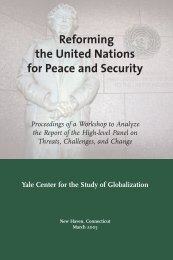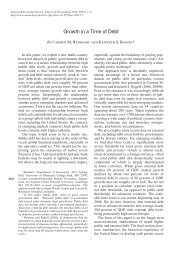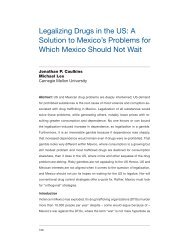The collapse of global trade, murky protectionism, and the crisis:
The collapse of global trade, murky protectionism, and the crisis:
The collapse of global trade, murky protectionism, and the crisis:
Create successful ePaper yourself
Turn your PDF publications into a flip-book with our unique Google optimized e-Paper software.
<strong>The</strong> <strong>collapse</strong> <strong>of</strong> <strong>global</strong> <strong>trade</strong>, <strong>murky</strong> <strong>protectionism</strong>, <strong>and</strong> <strong>the</strong> <strong>crisis</strong><br />
ly demonstrates <strong>the</strong> value <strong>of</strong> <strong>the</strong> WTO-based multilateral trading system.<br />
As President Moreno <strong>and</strong> <strong>the</strong> African Development Bank secretariat argue, <strong>the</strong><br />
Doha talks contain some <strong>of</strong> <strong>the</strong> most practical issues for developing nations. Latin<br />
America, Africa <strong>and</strong> parts <strong>of</strong> Asia are endowed with highly competitive agricultural<br />
sectors. <strong>The</strong> Doha talks are <strong>the</strong> only realistic way <strong>of</strong> fur<strong>the</strong>r opening world markets to<br />
such exports. O<strong>the</strong>r Doha-linked initiatives, such as Aid for Trade, <strong>and</strong> WTO <strong>trade</strong><br />
facilitation talks are also important for developing nations. Chapter 19 by Gerard<br />
McLinden covers <strong>the</strong>se issues in depth <strong>and</strong> suggests concrete steps G20 leaders could<br />
take.<br />
In his capstone essay, President Zedillo captures <strong>the</strong> consensus by arguing that G20<br />
leaders need to "descend" to <strong>the</strong> lowly task <strong>of</strong> deal making. <strong>The</strong>y should show up at<br />
<strong>the</strong> London Summit fully briefed on <strong>the</strong> most contentious issues, <strong>and</strong> proceed to outline<br />
compromises. This should be followed by an unequivocal commitment to do<br />
whatever necessary to have <strong>the</strong>ir Ministers deliver <strong>the</strong> so-called modalities by early<br />
summer 2009.<br />
Resist green <strong>protectionism</strong> – or pay <strong>the</strong> price at Copenhagen<br />
A final <strong>and</strong> very important point is made in Chapter 18, written by Simon Evenett<br />
<strong>and</strong> John Whalley.<br />
Many G20 leaders say <strong>the</strong>y want a climate change deal at <strong>the</strong> Copenhagen summit<br />
in December 2009. Most indications are that a climate-change deal would involve <strong>the</strong><br />
introduction <strong>of</strong> complex new taxes <strong>and</strong> schemes. Given <strong>the</strong> inevitable uncertainties<br />
<strong>and</strong> evolving nature <strong>of</strong> <strong>the</strong> challenges, such schemes must involve substantial discretion<br />
if <strong>the</strong>y are to be properly implemented. It is very naïve to think that developing<br />
country governments – whose assent is needed to conclude a climate change deal –<br />
will cooperate if <strong>the</strong>y feel that <strong>the</strong> discretion associated with existing environmental<br />
policies in industrialised countries was misused to shut out imports during <strong>the</strong> current<br />
<strong>global</strong> economic downturn. A developing country veto <strong>of</strong> a strong climate<br />
change deal may well be <strong>the</strong> price <strong>of</strong> <strong>crisis</strong>-induced green <strong>protectionism</strong>.<br />
G20 policymakers need to bear this in mind <strong>and</strong> instruct <strong>the</strong>ir government <strong>of</strong>ficials<br />
to implement environmental initiatives in a manner that not only puts foreign firms<br />
on an equal footing with domestic firms but also is seen to do so. Just like o<strong>the</strong>r forms<br />
<strong>of</strong> <strong>murky</strong> <strong>protectionism</strong>, being seen to give unequal treatment is almost as damaging<br />
as <strong>the</strong> unfair treatment itself.<br />
Conclusion: Push <strong>trade</strong> fur<strong>the</strong>r up <strong>the</strong> London Summit agenda<br />
Today's <strong>crisis</strong> is very different from <strong>the</strong> one facing Global leaders at <strong>the</strong>ir November<br />
2008 meeting in Washington. Last November, <strong>the</strong> <strong>crisis</strong> was, or at least was perceived<br />
as being, mostly a financial <strong>crisis</strong> – <strong>and</strong> mostly confined to <strong>the</strong> G7 economies. To use<br />
a military analogy, it was as if <strong>the</strong> <strong>crisis</strong> were a l<strong>and</strong>mine that <strong>the</strong> US <strong>and</strong> European<br />
economies had stepped on. Because <strong>the</strong> l<strong>and</strong>mine had also been 'planted' by US <strong>and</strong><br />
European financial markets, Brazil, India, China, South Africa <strong>and</strong> o<strong>the</strong>r emerging<br />
nations at <strong>the</strong> November 2008 meeting seemed to be only indirectly concerned.<br />
In <strong>the</strong> past six months, <strong>the</strong> l<strong>and</strong>mine <strong>crisis</strong> has become a cluster-bomb <strong>crisis</strong>, with<br />
recession-inducing projectiles flying in every direction. While G7 financial rescue <strong>and</strong><br />
macro stimulus efforts must be at <strong>the</strong> heart <strong>of</strong> <strong>the</strong> world's response, many G20<br />
nations – perhaps a majority – are byst<strong>and</strong>ers in discussions <strong>of</strong> massive stimulus<br />
packages <strong>and</strong> fundamental reform <strong>of</strong> <strong>the</strong> world's most sophisticated financial prac-<br />
7





